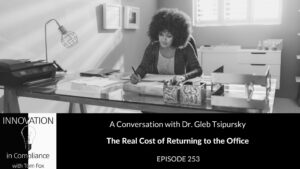
Dr. Gleb Tsipursky is the thought leader and CEO of Disaster Avoidance Experts, a boutique future-of-work consultancy that helps tech and insurance executives drive collaboration, innovation, and retention in hybrid work. Currently, he is focusing on normalizing hybrid and remote work, which he further discusses in his book, Leading Hybrid and Remote Teams. Tom Fox welcomes him to this week’s show to talk about Elon Musk’s misinformed views on remote work and why working from home is better for productivity levels.
Remote Work v. Working From the Office
Tom asks Dr. Gleb what drove him to write the article entitled, Elon Musk’s back-to-the-office order will undermine Tesla’s future. It was his response to Musk’s announcement to abolish remote work on the grounds that it made his employees unproductive, Dr. Gleb tells Tom. He has been researching hybrid remote work since the beginning of the pandemic, and found that remote workers are much more productive. A study at Stanford determined that productivity improved by 5% as office workers worked remotely. “They [workers] don’t have to do the unpaid labor of the commute and they can focus more on productive activities because they’re not interrupted,” Dr. Gleb explains.
Authoritarian Workplace
Tom asks Dr. Gleb if he believes a top-down command and control approach to leadership would work in 2022 and beyond. Dr. Gleb replies that this kind of leadership can only be successful in narrow environments. He believes that it is most successful in environments like warehouses “where you don’t need to be skilled, or a kind of manufacturing job where …you don’t need to do much innovative work.” However, since Tesla is an innovative company, command and control will undermine Tesla’s future. It is a company that requires knowledgeable and creative thinkers and those types of people would suffer under micromanagement. He also points out that demanding his employees to return to the office because he believes they are not working remotely, signals a lack of trust which is a very dangerous corporate culture.
The Fate of Tesla
Many of Tesla’s employees are innovators and creators; these include research and development staff and software engineers. Throughout the pandemic, these employees have been successfully and productively working from home, but now they are being forced to go out to the office. Naturally, these accomplished innovators would seek employment elsewhere, where they have comfortable working conditions. This leaves Tesla with employees who are conformists, who are okay with the authoritarian culture being imposed on them, and these people are less creative and innovative. Over time this will cause Tesla to lose the edge that makes them unique, Dr. Gleb argues.
Resources
Dr. Gleb Tsipursky | LinkedIn | Twitter
Disaster Avoidance Experts | Book – “Leading Hybrid and Remote Teams”



